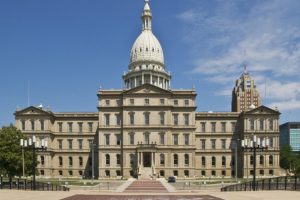 This Tuesday, Rep. Brandt Iden, supported by 3 other Republican members, reintroduced a package of legislation, also known as HB 4926, aiming to liberalize online casinos and online poker throughout the state. The bill was discussed on Wednesday morning by the House Regulatory Reform Committee, but its future still remains blurred as local tribal nations strongly oppose the bill, pointing out that it will violate their exceptional rights, granted by the Indian Gaming Regulatory Act (IGRA).
This Tuesday, Rep. Brandt Iden, supported by 3 other Republican members, reintroduced a package of legislation, also known as HB 4926, aiming to liberalize online casinos and online poker throughout the state. The bill was discussed on Wednesday morning by the House Regulatory Reform Committee, but its future still remains blurred as local tribal nations strongly oppose the bill, pointing out that it will violate their exceptional rights, granted by the Indian Gaming Regulatory Act (IGRA).
On Wednesday morning, the House Regulatory Reform Committee held a hearing to discuss the online gambling bill, which was introduced by Rep. Brandt Iden, who also performs the function of a Chairman of the Committee. Speaking of the iGaming bill, he explained that the process of passing the bill might be hard, but it is not a lost cause. Supposing the bill passes and enters the state’s legal code, Michigan will join Nevada, Delaware, and New Jersey, which already liberalized online gambling.
Odds for the Bill to Pass
 In fact, Michigan has a long history regarding the gambling expansion. In 2016, online gambling proponent and State Senator Mike Kowall introduced similar bill, but all of his efforts were in vain as the bill died after being stabbed by the opposition. The main reason for the bill to fail was that it would require tribal nations to abandon their sovereign immunity and pay taxes in case they want to add online gambling offerings to their casino profiles.
In fact, Michigan has a long history regarding the gambling expansion. In 2016, online gambling proponent and State Senator Mike Kowall introduced similar bill, but all of his efforts were in vain as the bill died after being stabbed by the opposition. The main reason for the bill to fail was that it would require tribal nations to abandon their sovereign immunity and pay taxes in case they want to add online gambling offerings to their casino profiles.
Nevertheless, on Tuesday Rep. Brandt Iden continued his forerunner’s mission and reintroduced an amended online gambling bill, which aims to smooth the edges of the sharp stones and win the tribal nations’ support. On the hearing day, all 3 tribal casino operators in Michigan explained that they do support the idea of online gambling, but they are against the gambling bill itself. To win their approval, the proponents of the bill offered the tribes a compromise solution, allowing them to enter the regulated online gambling market and keep their exceptional rights. It is yet to become clear if the tribal nations will agree to clear the way for the gambling bill to pass, but some speakers warned that the bill, in its current structure, may lead to certain problems.
With the advent of technologies, online gambling has become one of the leading tendencies on the market. It is expected that in the coming years, more states will express willingness to regulate their iGaming market. Currently, the states with regulated iGaming sector seem to reap a number of financial and social benefits, and more precisely a fresh revenue stream and safe gambling environment.



















